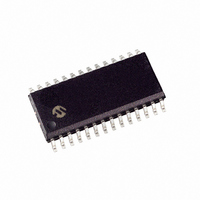ENC28J60-I/SO Microchip Technology, ENC28J60-I/SO Datasheet - Page 77

ENC28J60-I/SO
Manufacturer Part Number
ENC28J60-I/SO
Description
IC ETHERNET CTRLR W/SPI 28SOIC
Manufacturer
Microchip Technology
Specifications of ENC28J60-I/SO
Package / Case
28-SOIC (7.5mm Width)
Controller Type
Ethernet Controller, MAC/10Base-T
Interface
SPI
Voltage - Supply
3.1 V ~ 3.6 V
Current - Supply
160mA
Operating Temperature
-40°C ~ 85°C
Mounting Type
Surface Mount
Input Voltage Range (max)
5.5 V
Maximum Operating Temperature
+ 85 C
Minimum Operating Temperature
- 40 C
Mounting Style
SMD/SMT
Operating Supply Voltage
3.1 V to 3.6 V
Supply Current (max)
180 mA
Data Rate
10Mbps
No. Of Ports
1
Ethernet Type
IEEE 802.3
Interface Type
SPI
Supply Current
180mA
Supply Voltage Range
3.1V To 3.6V
Operating Temperature Range
-40°C To +85°C
Rohs Compliant
Yes
Peak Reflow Compatible (260 C)
No
Leaded Process Compatible
No
Product
Ethernet Controllers
Standard Supported
IEEE 802.3
Ethernet Connection Type
10Base-T
Digital Ic Case Style
SOIC
No. Of Pins
28
Lead Free Status / RoHS Status
Lead free / RoHS Compliant
For Use With
DM163024 - BOARD DEMO PICDEM.NET 2AC164123 - BOARD DAUGHTER ETH PICTAIL PLUSAC164121 - BOARD DAUGHTER PICTAIL ETHERNET
Lead Free Status / Rohs Status
Lead free / RoHS Compliant
Available stocks
Company
Part Number
Manufacturer
Quantity
Price
Company:
Part Number:
ENC28J60-I/SO
Manufacturer:
MICROCHIP
Quantity:
7 780
Part Number:
ENC28J60-I/SO
Manufacturer:
MICROCHIP/微芯
Quantity:
20 000
15.0
The ENC28J60 features a Built-in Self-Test (BIST)
module which is designed to confirm proper operation
of each bit in the 8-Kbyte memory buffer. Although it is
primarily useful for testing during manufacturing, it
remains present and available for diagnostic purposes
by the user. The controller writes to all locations in the
buffer memory and requires several pieces of hardware
shared by normal Ethernet operations. Thus, the BIST
should only be used on Reset or after necessary
hardware is freed. When the BIST is used, the ECON1
register’s DMAST, RXEN and TXRTS bits should all be
clear.
REGISTER 15-1:
© 2006 Microchip Technology Inc.
bit 7
Legend:
R = Readable bit
-n = Value at POR
bit 7-5
bit 4
bit 3-2
bit 1
bit 0
R/W-0
PSV2
BUILT-IN SELF-TEST
CONTROLLER
PSV2:PSV0: Pattern Shift Value bits
When TMSEL<1:0> = 10:
The bits in EBSTSD will shift left by this amount after writing to each memory location.
When TMSEL<1:0> = 00, 01 or 11:
This value is ignored.
PSEL: Port Select bit
1 = DMA and BIST modules will swap ports when accessing the memory
0 = Normal configuration
TMSEL1:TMSEL0: Test Mode Select bits
11 = Reserved
10 = Pattern shift fill
01 = Address fill
00 = Random data fill
TME: Test Mode Enable bit
1 = Enable Test mode
0 = Disable Test mode
BISTST: Built-in Self-Test Start/Busy bit
1 = Test in progress; cleared automatically when test is done
0 = No test running
R/W-0
PSV1
EBSTCON: ETHERNET SELF-TEST CONTROL REGISTER
W = Writable bit
‘1’ = Bit is set
R/W-0
PSV0
R/W-0
PSEL
Preliminary
U = Unimplemented bit, read as ‘0’
‘0’ = Bit is cleared
TMSEL1
R/W-0
The BIST controller is operated through four registers:
• EBSTCON register (control and status register)
• EBSTSD register (fill seed/initial shift value)
• EBSTCSH and EBSTCSL registers (high and low
The EBSTCON register (Register 15-1) controls the
module’s overall operation, selecting the testing modes
and starting the self-test process. The bit pattern for
memory tests is provided by the EBSTSD seed regis-
ter; its content is either used directly, or as the seed for
a pseudo-random number generator, depending on the
Test mode.
bytes of generated checksum)
TMSEL0
R/W-0
x = Bit is unknown
ENC28J60
R/W-0
TME
DS39662B-page 75
BISTST
R/W-0
bit 0


















